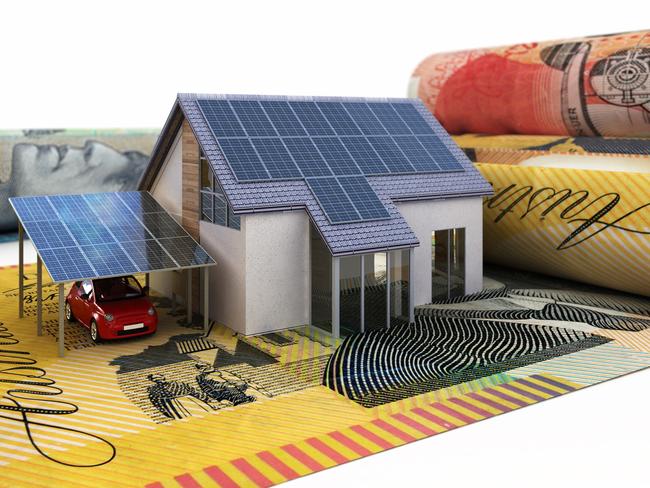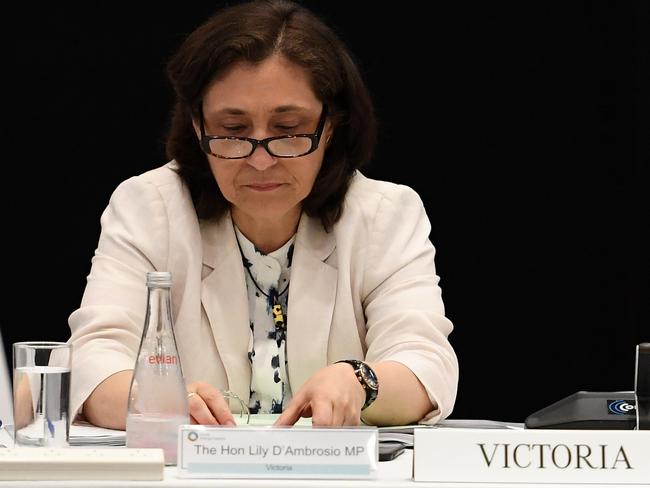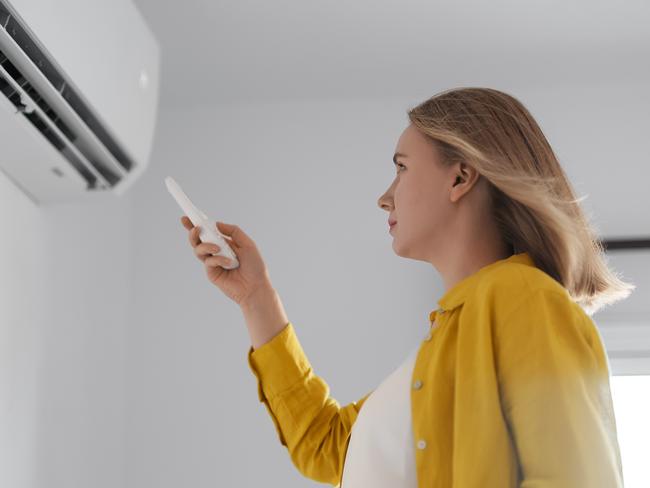New rental rules ‘final straw’ for battling Vic landlords: Everything you need to know about them
The Victorian government’s new rental laws, forcing landlords to spend thousands upgrading houses, are “the final straw” that will see investors flee the state and backfire on tenants, experts warn.
Victoria
Don't miss out on the headlines from Victoria. Followed categories will be added to My News.
The Victorian government’s new rental laws, forcing landlords to spend thousands upgrading the energy efficiency of their properties, will backfire on tenants through higher rents and a much smaller housing pool, experts are warning.
They will also force many cash-strapped ‘mum and dad’ type investors out of the Victorian property market.
Former national president of the Urban Development Institute of Australia (UDIA) Max Shifman said already strict tenancy rules, big land taxes and high mortgage interest rates had combined to see “landlords exit Victoria faster than anywhere else in the country”.
The Allan government’s recently announced energy efficiency rental rules would only speed that exodus up, he said.
“While these changes have merit, we should not pretend they come at no upfront cost — cash which many smaller landlords may not have or want to spend,” Mr Shifman, who is also CEO of one of Australia’s largest property developers, Intrapac, said.
“These extra charges could well be the straw for the proverbial camel’s back, for another round of landlords to exit the state … this can only lead to a reduced rental housing pool, spiking rents and hurting renters.”
Meanwhile, property law expert Andre Ong described the new Allan government regulations set to come into force in October next year as “another whack” for Victorian landlords, who were also struggling with rising cost of living.
Although the upgrades property owners would have to make under the new rules were reasonable — and would likely cost just a few thousand dollars — for some of his smaller landlord clients it could be enough to make them decide renting out was becoming too costly and just too much trouble, Mr Ong, the principal at Sharrock Pitman Legal principal and an accredited Victorian property law specialist, said.

Many of his clients were small investors with just one or two rental properties, who were trying to build a nest egg for their own and their families’ futures, he said.
For some it was a retirement plan.
And despite the government insisting the forced upgrades would increase the value of their properties, some landlords were questioning if that was actually the case, Mr Ong said.
“They will have a better rated heating system and better rated — from an energy efficiency sense — cooling system. Fantastic. But they will be asking if that is actually going to get them more rent? Is that actually helping them be able to afford this rental property and feeling like they are building towards their future? Or are they just tipping more money into this (property) and this few thousand dollars are actually what tips them over,” he said.
“The environment has changed for landlords. (There are) cost of living pressures — separate to government actions and land tax — that are adding to that.
“Australia as a nation hasn’t really been one where you have your residential rental investment as a positively geared thing, it tends to be neutral or negatively geared, so in that situation, you’re always a little bit under on the cash flow, and now you have higher taxes and your own cost of living pressures and higher mortgage on your own home.

“Then the question arises from a family perspective of whether this is a sensible thing for you (to continue with) into the future … as a wealth-building mechanism and a way to be able to provide for yourself and your retirement and help your family overall?
“If you can’t sustain your own standard of living whilst maintaining this asset, then the only course is really to sell it … so more and more people are having those discussions.
“I don’t know that floodgates have opened yet … but I think it is moving in that direction.”
NINE KEY QUESTIONS ANSWERED
1. What are the proposed new rental rules?
The strict new requirements seek to ensure all properties have ceiling insulation, are draught proofed, have efficient hot water and cooling systems.
Landlords will be required to install insulation, 4-star shower heads in all showers, and blind cord anchors, and draught-proof windows and doors before signing a new lease.
Hot water and heating and cooling systems will have to be upgraded to energy efficient models when old ones reach their end-of-life, and a 3-star cooling rating will be imposed for systems in the main living area.
2. What will it cost landlords if they have to make all the upgrades?

Energy Minister Lily D’Ambrosio has said making the full suite of upgrades would set landlords back about $5000 but added it would be unlikely they would need to update all of the appliances at once. She has also said the transition will add value to rental properties, benefiting landlords in the long term.
3. How will the new rules benefit renters?
Ms D’Ambrosio has said the changes could save renters about $567 per year off their energy bills, through the upgrade to more efficient hot water and heating and cooling systems. Renters will also be more comfortable in their homes.
4. What are the concerns?
Property Council of Australia Victorian executive director Cath Evans has said there must be measures in place to prevent the extra costs being placed on owners being passed on to tenants through rent.
Without support to landlords in the form of subsidies, the state risked “a further contraction of supply in the rental market”, she said.
“While we support improvements in living conditions and energy efficiency for renters, owners are already significantly burdened by massive increases in land tax, council rates and insurance premiums as well as increased interest rates,” Ms Evans said.
Meanwhile, Real Estate Institute of Victoria president Jacob Caine said while energy efficiency improvements were welcome, the new requirements should not put further financial strain on landlords, many of whom were small investors and already doing it tough.
5. When do the new rules come into effect?
The new rules will come into play from October 30 next year and consultation around their introduction is currently taking place.
To allow sufficient time for compliance, a staged commencement of each standard is proposed. Compliance with the standards will be triggered differently for each standard, starting from a date 12 months after the proposed regulations are made.
6. What are the specified dates and specific requirements for each upgrade?

Blind cord safety anchors: By October 30, 2025.
Ceiling insulation: From October 30, 2025, where there is a new rental agreement or conversion from fixed term to periodic rental agreement; and where there is no ceiling insulation present.
Cooling: From October 30, 2025, if there is no existing cooling, where there is a new rental agreement or conversion from fixed term to periodic rental agreement or where there is existing cooling, but the system is at the end of its life. From October 30, 2027, all rental properties must have a fixed cooling system.
Draughtproofing: From October 30, 2025, where there is a new rental agreement or conversion from fixed term to periodic rental agreement.
Heating in residential properties: From October 30, 2025, at the end of the life of the existing fixed heating system.
Heating in rooming houses: By October 30, 2025, where there is no existing fixed heating system or where there is existing fixed heating in the bedroom but it’s old and at the end of its life.
Hot water: From October 30 2025, when the existing hot water system is old and at the end of its life.
Shower head: From October 30, 2025, where there is a new rental agreement or conversion from fixed term to periodic rental agreement.
7. Why are the rules being brought in?
In line with the Victorian government’s commitments under the Gas Substitution Roadmap Update and the transition towards net zero emissions by 2045, additional minimum standards for rental properties and rooming houses relating to energy efficiency are proposed to ensure that renters and rooming house residents are provided with comfortable and energy efficient living arrangements.
8. Will there be any exemptions in certain cases?
Yes, the proposed regulations provide a range of exemptions in relation to each standard recognising practical difficulties that may arise for some rental providers in meeting the proposed standards, such as conflicting owners corporation rules or where an appliance is being replaced under a manufacturer, supplier, or installer warranty.
9. What is the next step?
At the conclusion of the public consultation stage, the Victorian government will review and consider the survey responses and submissions received and says that the stakeholder feedback received will inform the finalisation of the proposed regulations.
Once the final form of the proposed regulations has been approved by the Minister for Consumer Affairs, a statement of reasons will be published on the Engage Victoria platform setting out the reasons for the final form and content of the proposed regulations and responding to any issues raised in stakeholder submissions.


